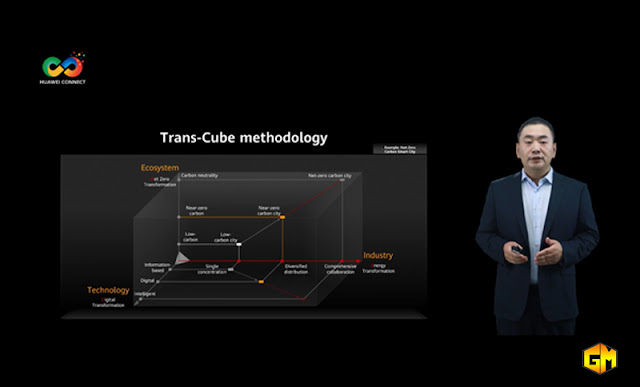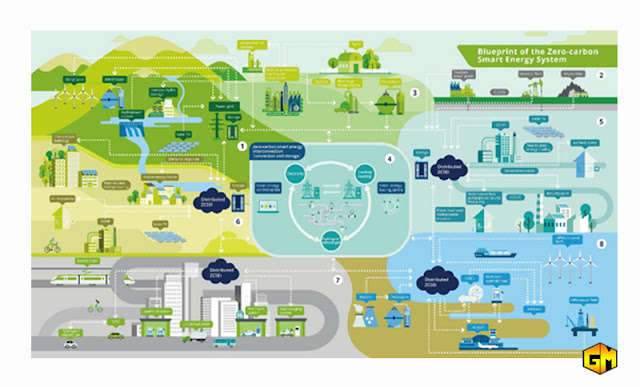Huawei hosted the Energy Summit online, which was held within the framework of HUAWEI CONNECT 2021 and themed "Digital Energy, Powering the Low Carbon Era".
During the summit, customers and partners discussed best practices in using new technologies to transition the energy industry toward carbon neutrality. Huawei also released the Global Energy Transition and Zero Carbon Development White Paper and shared its Energy Trans-Cube Strategy.
Energy Trans-Cube, Creating New Value for the Industry After signing the Paris Agreement in 2015, more countries than ever before are committed to carbon neutrality and are taking positive actions to address climate change. Each one follows a different path, suitable to its resource profile, energy, and environment.
"Despite the strong will to go carbon neutral, we need to take into account three challenges: green and low carbon development, economic development, as well as the security and continuity of energy supply. The convergence of energy transformation and digital transformation will pave the digital way for carbon neutrality," - David Sun, Vice President of Huawei Enterprise BG and President of the Global Energy Business Unit.
"Huawei has developed a Trans-Cube methodology. It suggests that to get closer to a net-zero carbon intelligent energy system and achieve global zero-carbon development, we should build three core capabilities — net-zero carbon transformation, energy transformation, and digital transformation." - Sun added.
The first capability — net-zero carbon transformation will help various industries manage their carbon assets, and implement de-carbonization actions suitable to their specific contexts. In the process, they will go from low-carbon to near-zero carbon, and eventually achieve carbon neutrality.
Then, energy transformation will make energy production and consumption more reliable, secure, and efficient, transforming from a single centralized system to a diversified, distributed, and integrated one. The ultimate goal is to achieve multi-energy coordination and optimize efficiency.
Last but not least, there is digital transformation, which will enable the industry to transform from information-based to digital, and finally intelligent. With data at its core, digital transformation will enable net-zero carbon transformation and energy transformation.
White Paper Release — New Ideas to Lead the Industry
According to Guo Xiaobo, Energy expert at Deloitte China, going carbon neutral means achieving energy transformation and zero-carbon development as soon as possible, using more renewable resources, changing the way we use energy, and using new technologies to reduce emissions. Based on this, the Global Energy Transition and Zero Carbon Development White Paper analyzes the key factors affecting energy transition, and proposes a new plan for the energy sector — building a net-zero intelligent energy system.
The said system focuses on interconnecting oil, gas, electricity, heat, and hydrogen systems, and aims to achieve secure, reliable, efficient, cost-effective, and clean energy. Anthony Hu , Chief Representative for Energy Transition (Carbon Neutrality), Global Energy Business Unit of Huawei Enterprise BG, said, "The architecture of the net-zero intelligent energy system will interconnect the energy system, carbon system, and ICT infrastructure as well as eventually converging energy, carbon, information, and value flows. Gradually, it will form a system with data at its core, promoting the digitalization of the energy industry."
Drive Data to Barrel, Embrace Intelligence to Grow
The digital transformation and intelligent development of the oil and gas industry is still in its infancy. According to Lv Gongxun, Senior Consultant of Huawei and Former General Manager of China National Corporation for Exploration and Development of Oil and Gas (CNODC), digital transformation signals four opportunities for the industry: rebuilding business models, transforming management models, innovating business models, and accelerating transformation and value growth.
Lv Gongxun also discussed the value of cloud for the oil and gas industry: "Cloud technologies enable centralized information resource planning, intelligent management and control, flexible provisioning, convenient services, and high Document security and efficiency. They will transform the existing business models."
Power grids are another important area of energy transformation, rapidly evolving with new technologies. In this context, Felix Chifwaila, Senior Manager of Electro-Technical Services at ZESCO, introduced the role of video and AI in improving grid O&M capabilities. For example, visualizing channel data leads to fewer operational risks and makes inspection 80 times more efficient. Video and AI also help detect potential faults in time, helping eliminate 90% of power outages every year. Having an intelligent inspection platform and apps leads to 30% more efficient emergency response and maintenance. Mr. Chifwaila noted, "ZESCO is looking forward to continued cooperation with Huawei, helping ZESCO become a regional power hub in digital transformation."
Like many others, Huawei started out as a non-digital native enterprise. This means that the company has accumulated extensive experience and lessons learnt through both internal projects and industry practices. It has a first-hand understanding of the challenges traditional enterprises face during digital transformation and has paved a "digital way" for the transformation and development of the energy industry.













.jpg)

No comments:
Post a Comment